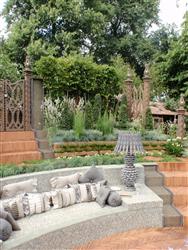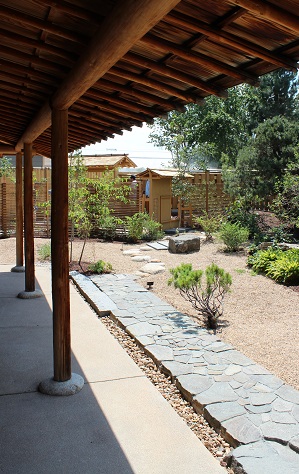Study the Foundation Certificate in Garden Planning and Development Level 3 by Distance Learning.
 Learn about garden design and planning.
Learn about garden design and planning.
- Study methods of construction and planting.
- Find a job, start a business, work in landscaping.
- 150,000 words of unique course notes developed by our staff.
- Support from an international team of highly qualified horticulturists and landscape professionals based both in the UK and Australia.
COURSE STRUCTURE AND CONTENT
Course Duration: 200 hours.
Start Date: Start at any time - study at a pace that suits you, and with full tutor support for the duration of your studies.
Lessons
The course comprises 4 units which are covered by 15 lessons.
Lesson 1 - History of Garden Design and Styles
- Garden Styles
- The Earliest Private Gardens
- Ancient Mid-Eastern Gardens
- English Garden History
- The English Landscape Garden
- Japanese Influences
- Important English Landscapers
- Monastery Gardens
- Hispano-Arabic Gardens
- Italian Gardens
Lesson 2 - Site Appraisals, Basic Surveying Techniques and Client Briefs
- Influence of Trees on Buildings
- Influence of Trees on Atmosphere
- Species Suitability
- Planning Considerations
- Pre Planning Survey - Appraising the Site and Collecting Data
- Understanding Soils
- Soil Texture
- Nutrient Availability and pH
- Landscape Plans and Survey Techniques
- Site Plan/Base Plan
- Topographic Plan
- Concept Plan
- The Final Plan
- The Planting Plan
- Surveying Techniques
- Steps in the Design Procedure
- Landscape Graphics
Lesson 3 - Principles and Elements of Garden Design and the Influence of Site Characteristics
- Principles and Elements of Landscape Design
- Creating Landscaping Effects
- Colour and Garden Design
- Influence of Site Characteristics
- The Sun’s Path and Its Affect on Shade
- Extending the Garden Potential
- Fragrant Trees and Shrubs
- Potager and Picking Gardens
- Determining Shadow Length
- Gardens with a Sense of Mystery
- Focal Point Ideas
- Gardens for Children
- User Friendly Gardens
- Seating
- Shelters
Lesson 4 - Hard Landscaping Features and their Contribution to Garden Design and Function
 Hard Surfacing
Hard Surfacing
- Paving
- Flexible and Rigid Paving
- Materials Used in Paving
- Selecting Materials
- Coloured Surfaces
- Barriers and Walls
- Creating Barriers
- Fences
- Plants to Grow on Trellis
- Stone Walls
- Garden Structures
- Gazebos,Verandahs,Pergolas
- Where to build in the Garden
- Accessibility
- The direction of the sun
- Views
- Drainage
- Rockeries
- Rockery Ideas
- Water Gardens
- Fountains, Waterfalls, Pot Ponds, etc
- Using Water Features in the Landscape
- Planning for Children's Play
- Play Differs with Age
- Child Safety
- Designing the Garden for Children
- Play Equipment for Different Ages
- Recommended Play Surfaces
- Environmental Sustainability
Lesson 5 - The Function of Drainage Systems in the Garden
- Symptoms of Poor Drainage Systems
- Typical Permeability Rates
- Solving Drainage Problems
- Hard Drainage Methods
- Soft Drainage
Lesson 6 - Soft Landscaping Features and their Contribution to Garden Design and Function
- Plant Selection
- Plant Varieties
- Colourful Year Round Foliage
- Plants that Tolerate Poor Drainage
- Coastal Plantings
- Trees
- Selecting Woody Plants
- Deciduous or Semi-deciduous Trees
- Evergreen Trees
- Flowering Shrubs
- Selecting Flowering Shrubs
- Establishing Woody Plants
- Planting Procedure
- Windbreaks, Hedges and Screens
- Establishing Hedges and Screens
- Pruning or Trimming an Established Hedge
- Alpine Plants
- Selecting Annual Plants
- Types of Annual Plants
- Selecting Annuals of Differing Heights
- Perennials
- Selecting Herbaceous Perennial Plants
- Maintenance Hints For Perennials
- Scented Plants
- Dry Gardens
- Selecting Water Plants
- Establishing Water Plants
Lesson 7 - Turf and its Contribution to Garden Design and Function
- The Benefits of Turf
- Selecting Turf
- Turf Varieties
- Lawn Mixes
- Wild Flower Meadows
- Turf Establishment
- Soil Preparation
- Sodding/Instant Turf
- Golden Rules for Laying Instant Turf
- Drainage
- Mowing Turf
- Mowing Heights
- Direction of Cut or Pattern of Cutting
- Mower Safety
- Other Turf Maintenance Techniques
- Fertilising Turf
- Weed Control
- Preventing Dispersal
- Non Chemical Control Methods
- Herbicide Use in Turf
- Turf Health Problems
- Commonly Used Chemical Pesticides
- Commonly Used Chemicals; fungicides
- Spray Equipment
- Domestic Lawn Care Program
- Turf Water Needs
- Understanding the Movement of Soil Water
- Irrigating Turf
Lesson 8 - Setting out a Site to Scale Plans and Drawings
- How Landscape Plans are Presented
- Setting Out the Site for Landscape Construction
Lesson 9 - Earthworks, Soil Storage and Drainage Systems
- Earthworks
- Slope Stability
- Soil Types and Foundations
- Try to Maintain Vegetation Cover Where Possible
- Developing a Grading Plan
- Required Grading Drawings
- Grading Operations
- Earth Moving Machinery
- Use Experienced Operators
- Cost of Earthworks
- Earthworks Calculations
- Volumes of Irregular Solids
- Land Drainage Systems
- Drainage Design
- Springs and Under-ground Water Courses
- What a Landscaper Should Know about Drainage
- Sub Surface Drainage
- Gradients
- Distance between Drain Pipes
- Depth of Drains
- Types of Drains
- Laying the Drain
Lesson 10 - Landscape Construction Procedures and Materials
- Paths
- Load Bearing Capacity
- Concrete Reinforcement
- Paving Essentials
- Paving a Slope
- Setting out Circular Paving
- Curved Paving
- Concrete Surfaces
- Laying Pebbles
- Building a Timber Deck
- Decking Materials
- Decking Around Pools
- Changing Levels , step by step
- Ramps
- Railings
- Retaining Walls
- Construction Materials
- Types of Retaining Walls
- Drainage
- Timber
- Dry Stone Walls
- Clay Block Walls
- Recycled Rubber Walls
- How to Render a Wall
- Fencing
- Fencing Materials
- Supporting the Fence
- Tips for Building a Timber Fence
Lesson 11 - Constructing Rock Gardens and Water Features
- Rockeries
- How to Build Artificial Rocks
- Ponds
- Construction of a Water Garden
- How to Make a Water Garden using a Liner
- How to make a Water Garden using a Preformed Unit
- Pumps
- Pond Filtration Systems
- Work Safety
- Safe Work Management Plans
- Risk Assessment of a Landscape Construction Site
- Risk to the Project
- Risk to the Workers
- The Adequacy of Existing Controls
- Risk Control Methods
- Example of a Risk Assessment Procedure
- Example Risk Assessment of Protected Crop Production
- Safety Techniques
- Manual Lifting
- How to Lift
- Using Machines to do the Heavy Work
Lesson 12 - Amenity Bedding Schemes
- Flower Bed Layout for Annuals
- Other Types of Bedding Schemes
- Shapes for Beds
- Achieving the Best Results
- Colour Themes
- Get Your Timing Right and Getting the Most out of Your Flower Bed
- Using Perennials
- Herbaceous Perennials
- Making Garden Beds - The Variables
- Planting
- Basic Planting Procedure
- Staking
- Time of Planting
- Mulching
- Pruning
- Water
- Popular Annuals
- Supporting Herbaceous Plants
- Shade Tolerant Perennials
- Bulbs which Grow in Shade
- Plant with Fragrant Flowers
- Fragrant Foliage
- Night Scented Plants
- Some Evergreen Perennials
- Ornamental Grasses
- Ornamental Grasses for Year Round Effect
- Some Ornamental Grass-like Plants
Lesson 13 - Specialist Garden Areas and Urban Garden Options
- Specialist Garden Areas
- Garden Ornaments
- Plants for the Eclectic Garden
- Art Gardens
- Plants for Topiary
- Hedges
- Pleaching
- Miniature and Table Top Gardens
- Trough Gardens
- Urban Gardens; other options
- Acclimatising Indoor Plants
- How to Care for the Acclimatising Plant
- Acclimatising Period
- How to Help Indoor Plants Survive
- Watering Pot Plants over Short Periods
- Fertilising
- Re-potting Tips
- Inner City Gardens
- Types of Inner City Gardens
- Community Gardens
- Living Walls
- Courtyards
- Making a Small Courtyard Look Bigger
- Natural Garden Planting Design
- Planting Design Elements for the ‘Natural Garden’
- Some Plants suited to Wild Gardens
- Wildlife in Gardens
- How Plants Benefit Birds
- Using Ferns in Shaded Areas
- Sensory Gardens
- Low Maintenance Amenity Gardens
- Container Plants
- Planning the Cropping Program
- Getting the Best Out of the Vegetable Plot
- Sowing Vegetable Seeds
- Sowing and Transplanting Guide
- Broad Bean
- Beetroot
- Broccoli
- Brussels Sprouts
- Cabbage
- Capsicum
- Carrot
- Corn(Sweet Corn)
- Celery
- Lettuce
- Onion
- Pak Choi
- Parsnip
- Pea
- Potato
- Pumpkins, Marrows and Squash
- Silver Beet
- Spinach
Lesson 14 - Specialist Pruning Techniques
- The Basic Rules of Pruning
- Pruning and Rejuvenating
- Controlling the Plants Shape and Size
- Pruning Overgrown Shrubs
- Removing Dead or Diseased Wood
- Controlling the Type of Growth
- Rejuvenation Limitations
- Pruning overgrown climbers and wall shrubs
- Pruning Roses
- Rejuvenating Old and Overgrown Hedges
- Specialist Pruning Techniques
Lesson 15 - Adapting Gardens for Water Sustainability
- Conserving Water in the Garden
- Reducing run-off
- Collecting and Storing Water
- Water Quality
- Recycling Water
- Saving water in the garden
- Minimising Plant Water Requirements
- Irrigation - water saving techniques
- Mulch
- Mulch Materials
- The Green Roof
HOW THE COURSE WORKS

You can start the course at any time.
It is studied by distance learning, so you can study Plant Growth, Propagation and Development in the comfort of your own home. But this doesn't mean you are all alone in your studies. Our highly qualified and friendly tutors are there to help you every step of the way. If you have any questions at all, they are always happy to help.
Each lesson includes set tasks, and is completed with an assignment which the student submits to their course tutor. The tutor will mark the assignment and return this to the student with comments and suggestions for further reading.
WHY CHOOSE ACS?
- Our courses are written and taught by experienced professionals, so you know you can expect a high quality of teaching and support.
- You can start the course at any time and study at your own pace.
- Fit your studies around your own busy lifestyle - we provide full tutor support.
- Study where you want to - online studies offer the flexibility for you to determine where and when you study.
BENEFITS OF STUDYING THIS COURSE
Graduates will feel confident that they can be assured that they will stand in good stead for employment opportunities in a range of horticulture areas including:
- Landscaping
- Garden design
- Garden maintenance
- Garden conservation and restoration
- Parks and gardens
WHY DELAY? ENROL TODAY.
It's easy to enrol - simply go to the enrolment box at the top right-hand side of this page. If you have any QUESTIONS, please do get in touch with us - our horticulture tutors would love to hear from you; connect with them using our FREE COURSE COUNSELLING SERVICE.
Stay in Touch. Follow us on:
Twitter
Facebook
Google